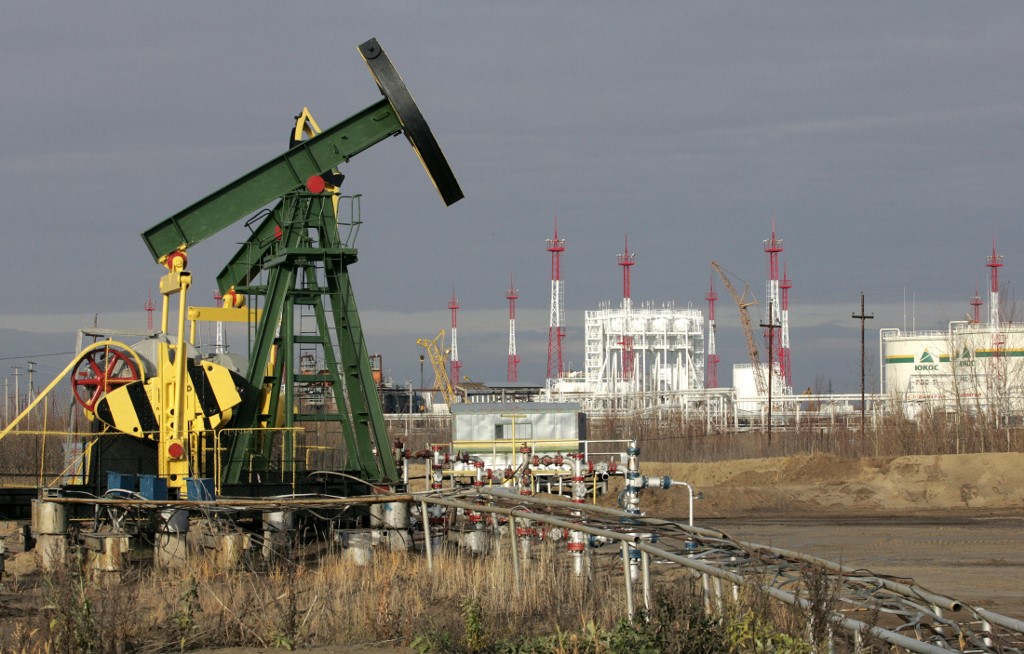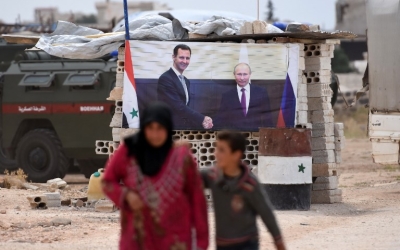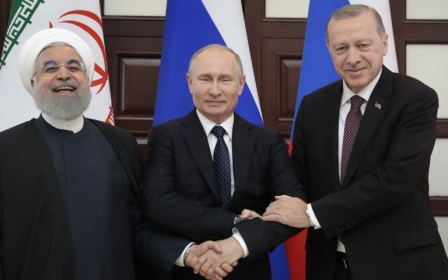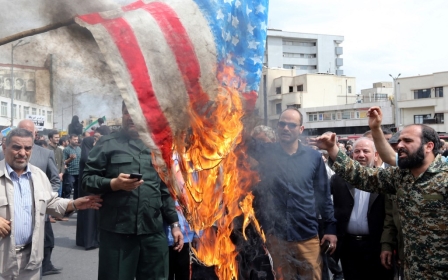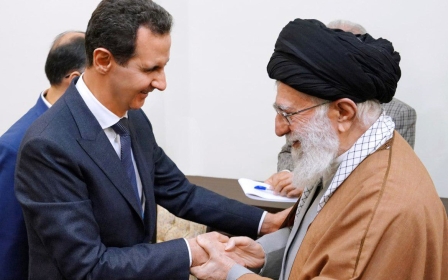Why an isolated Iran is a boon for Putin
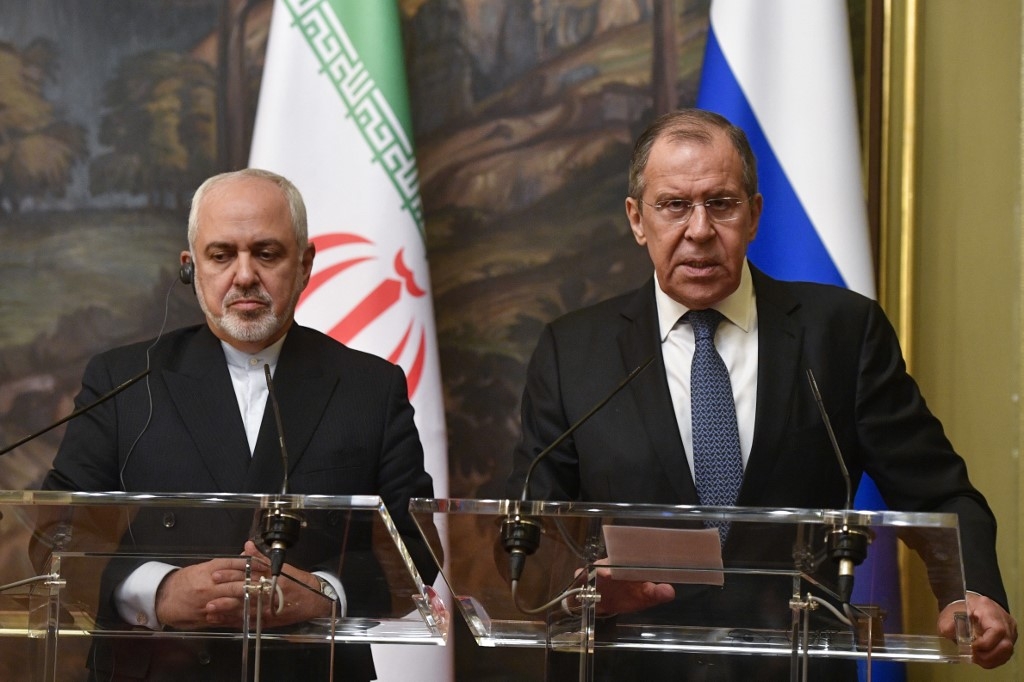
After Iran’s decision to reduce its nuclear commitments on 8 May, a year after the US withdrew from the nuclear deal, Russia was perhaps the most sympathetic to Tehran among the signatories of the multilateral accord.
While the European powers - France, Germany and Britain - were critical of Iran’s move, and China stressed the importance of ensuring the deal is fully implemented, Moscow blamed the US pullout and “maximum pressure” policy, including comprehensive sanctions, for Iranian countermeasures.
“Iran might take retaliatory steps, and say that it’s leaving [the agreement], but tomorrow everyone will forget it was triggered by the US and all the blame will be put on Iran,” Russian President Vladimir Putin said at a press conference on 15 May.
Growing tensions
Tehran’s move towards a multi-stage withdrawal from the nuclear deal is affecting the dynamics of Russian-Iranian relations, as Moscow seeks to make the most of growing tensions between Tehran and Washington.
New MEE newsletter: Jerusalem Dispatch
Sign up to get the latest insights and analysis on Israel-Palestine, alongside Turkey Unpacked and other MEE newsletters
Although the Kremlin is not in favour of another game-changing, US-led war in the region, it is poised to be the greatest beneficiary of Tehran’s potential abandonment of the nuclear deal and consequent increased international isolation. Russia views itself on par with the US, not Iran, and is indignant at the West’s persistent refusal to treat it as such.
Given the fundamentally different strategic objectives and interests of both powerbrokers, the Assad government seems to be looking the other way
The Kremlin has historically used Tehran as a source of leverage to balance its relations with Western powers, particularly Washington. In the 1990s, Russia and Iran signed a deal to construct a nuclear plant at Bushehr, but Moscow dragged its feet to accommodate US demands for increasing pressure on Tehran. Costly delays enabled Russia’s nuclear industry to stay afloat at a time of scarce funding, and Iran had to foot the bill.
“Russia is not a fire brigade,” Putin quipped in last month’s press conference. “We cannot rescue everything that does not fully depend on us. We’ve played our part.”
Since the Trump administration pulled the US out of the nuclear deal in May 2018, Russia’s “part” has mostly revolved around efforts to take strategic advantage of Iran’s contested position and decreasing manoeuvrability.
This has manifested itself most evidently in the oil market, as well as in the Syrian civil war, which both Tehran and Moscow have helped the Assad government to win.
Oil output
With the US-led, anti-Iran wave escalating in the region, the Kremlin has moved closer to Israel and powerful Sunni Arab states led by Saudi Arabia.
Last year, Russia struck a private deal with the Saudis to boost oil output without consulting the Organization of the Petroleum Exporting Countries (OPEC) - and at the expense of Iran. At the time, US President Donald Trump had called for increased production to lower fuel costs.
More recently, a key Russian energy official signalled Moscow’s desire to raise crude output in June due to improving market conditions. Later in April, the White House announced that it would end exemptions from sanctions for buyers of Iranian crude, including China, Japan, India, South Korea and Turkey.
With Iran kicked out of the international oil market, Russia will be free to resume pumping petroleum at full capacity when output curbs agreed with OPEC expire in June, according to a Bloomberg report citing Dmitry Marincheko, an oil and gas director at Fitch Ratings. This means an extra $6bn in export revenue annually.
But the most neglected, yet significant arena for Iranian-Russian power competition has been unfolding in Syria, where both backers of the Assad government are trying to reap economic and geopolitical benefits from their military investments, now that the civil war is slowly drawing to a close and plans for post-conflict reconstruction are gaining traction.
Over the past year, both sides have engaged in deadly clashes and exchanged fire in various parts of the war-ravaged country. Given the fundamentally different strategic objectives and interests of both powerbrokers, the Assad government seems to be looking the other way.
“Generally speaking, the Syrian government seems quite happy with balancing between two external backers,” Aron Lund, a fellow with the Century Foundation, told Middle East Eye. “Both have an interest in keeping Assad in power, and if one gets too pushy, he can lean a little more on the other.”
Rebuilding Syria
One key area of competition is Syria’s post-war economy and the controversial role both sides want to play in the profitable reconstruction initiatives.
In January 2017, five memoranda of understanding were signed between Iran and Syria, including contracts for mining phosphate, supplying mobile phone services, and installing oil and gas terminals. Then, earlier this year, the Syrian government reportedly leased to Iran parts of the port city of Latakia, where the two countries have plans to build a power plant.
Notably, the Latakia presence would put Iranians in close proximity to the Hmeimim air base - located less than 25 kilometres away and operated by Russia - and thus enable them to closely monitor Russian moves in the wider coastal area. Not surprisingly, Moscow is in negotiations with Damascus to finalise the lease of the Tartus port, which already hosts a Russian naval base, for 49 years.
“Today, Iranian-Russian divergence can be seen mainly in the struggle for military-political power. Perhaps in a sense, Moscow seeks to limit Iran’s influence, primarily to advance its own interests - but I doubt this would be very plausible,” Anton Mardasov, a Syria expert at the Russian International Affairs Council, told Middle East Eye.
In the military-security sphere, Israeli air strikes on Iranian positions have been a major bone of contention, as Russia’s advanced missile-defence systems were not activated to fend them off. This has raised suspicions within the security and intelligence community in Tehran that Moscow was siding with Israel to foil Iran’s military entrenchment in Syria.
Fundamental rivalry
In the context of these growing tensions, Russian Deputy Foreign Minister Sergei Ryabkov rebuffed the idea of an “alliance” between the two powerbrokers in Syria. “I wouldn't use this type of words to describe where we are with Iran,” he said in a January interview with CNN.
As Syria expert Joshua Landis of the University of Oklahoma told Middle East Eye, the Iranian-Russian rivalry in Syria “has also been the subject of tremendous spin and misinformation over the last several months”. He cited an Israeli report that included allegations that Moscow had “established secret detention centres inside Syrian prisons in Damascus that are being used to interrogate hundreds of officers in Syrian pro-Iranian militias”.
Their cooperation has been structurally uneven and occurred against a backdrop of fundamental rivalry, usually ending in favour of Russia
“Russia and Iran have been cooperating together quite successfully for over almost a decade to extend their influence in the northern Middle East. I doubt they will destroy that success by falling out over Syria,” Landis added. “If policymakers are building their plans on this narrative of ‘a falling-out amongst thieves’, I fear that they will be disappointed.”
Yet, their cooperation has been structurally uneven and occurred against a backdrop of fundamental rivalry, usually ending in favour of Russia.
With Iran’s isolation expected to intensify in the wake of its gradual withdrawal from the 2015 nuclear deal, Tehran will likely find itself more dependent on Moscow and increasingly left with little choice other than to play by the Kremlin’s rules.
The views expressed in this article belong to the author and do not necessarily reflect the editorial policy of Middle East Eye.
Middle East Eye delivers independent and unrivalled coverage and analysis of the Middle East, North Africa and beyond. To learn more about republishing this content and the associated fees, please fill out this form. More about MEE can be found here.



